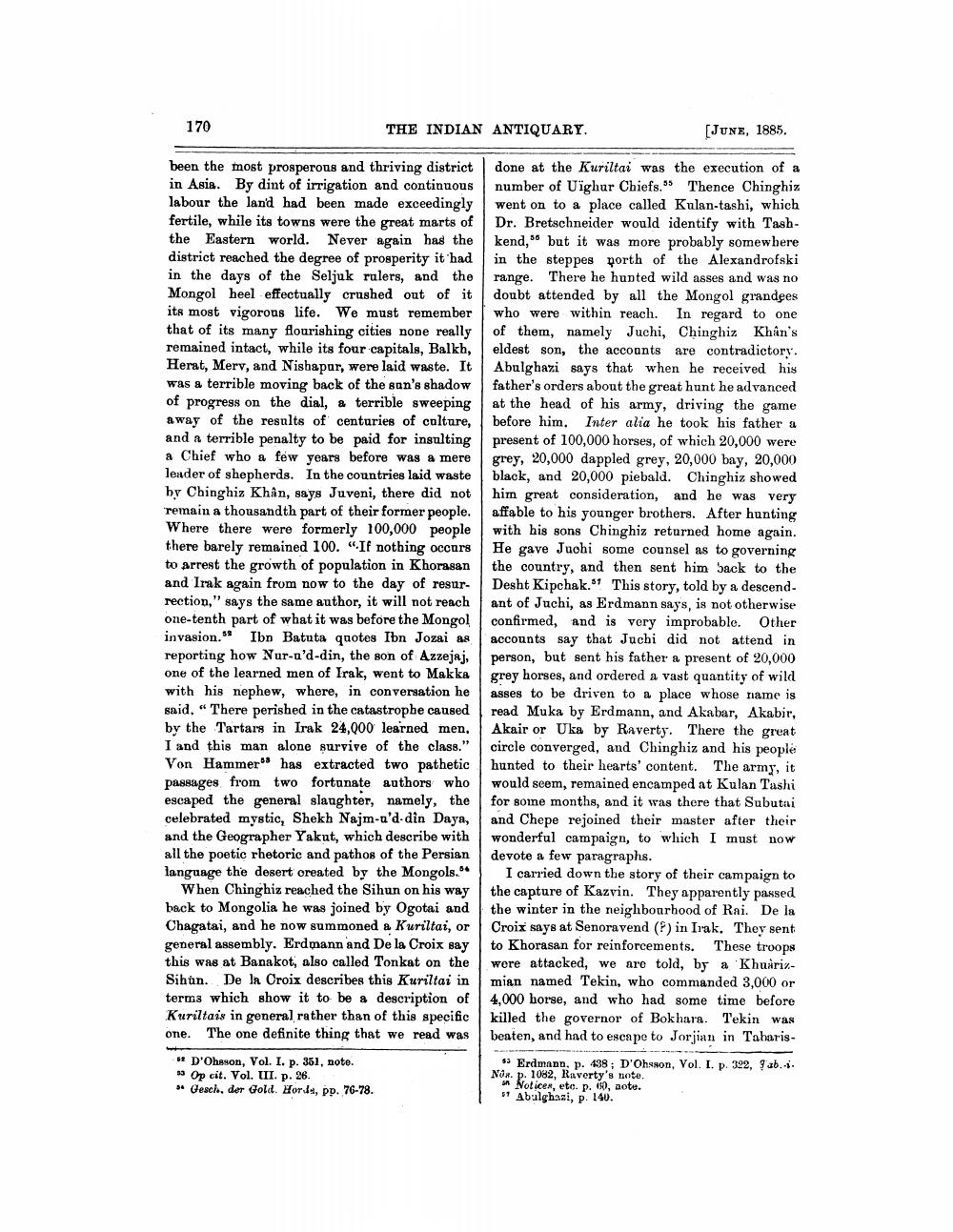________________
170
THE INDIAN ANTIQUARY.
[JUNE, 1885.
been the most prosperous and thriving district in Asia. By dint of irrigation and continuous labour the land had been made exceedingly fertile, while its towns were the great marts of the Eastern world. Never again has the district reached the degree of prosperity it had in the days of the Seljuk rulers, and the Mongol heel effectually crushed out of it its most vigorous life. We must remember that of its many flourishing cities none really remained intact, while its four capitals, Balkh, Herat, Merv, and Nishapur, were laid waste. It was a terrible moving back of the sun's shadow of progress on the dial, a terrible sweeping away of the results of centuries of culture, and a terrible penalty to be paid for insulting a Chief who a few years before was a mere leader of shepherds. In the countries laid waste by Chinghiz Khan, says Juveni, there did not remain a thousandth part of their former people. Where there were formerly 100,000 people there barely remained 100. "If nothing occurs to arrest the growth of population in Khorasan and Irak again from now to the day of resurrection," says the same author, it will not reach one-tenth part of what it was before the Mongol invasion." Ibn Batuta quotes Ibn Jozai as reporting how Nur-u'd-din, the son of Azzejaj, one of the learned men of Irak, went to Makka with his nephew, where, in conversation he said, "There perished in the catastrophe caused by the Tartars in Irak 24,000 learned men. I and this man alone purvive of the class." Von Hammer" has extracted two pathetic passages from two fortunate authors who escaped the general slaughter, namely, the celebrated mystic, Shekh Najm-a'd-din Daya, and the Geographer Yakut, which describe with all the poetic rhetoric and pathos of the Persian language the desert created by the Mongols.
When Chinghiz reached the Sihun on his way back to Mongolia he was joined by Ogotai and Chagatai, and he now summoned a Kuriltai, or general assembly. Erdmann and De la Croix say this was at Banakot, also called Tonkat on the Sihun. De la Croix describes this Kuriltai in terms which show it to be a description of Kuriltais in general rather than of this specific one. The one definite thing that we read was
done at the Kuriltai was the execution of a number of Uighur Chiefs." Thence Chinghiz went on to a place called Kulan-tashi, which Dr. Bretschneider would identify with Tashkend, but it was more probably somewhere in the steppes porth of the Alexandrofski range. There he hunted wild asses and was no doubt attended by all the Mongol grandees who were within reach. In regard to one of them, namely Juchi, Chinghiz Khan's eldest son, the accounts are contradictory. Abulghazi says that when he received his father's orders about the great hunt he advanced at the head of his army, driving the game before him. Inter alia he took his father a present of 100,000 horses, of which 20,000 were grey, 20,000 dappled grey, 20,000 bay, 20,000 black, and 20,000 piebald. Chinghiz showed him great consideration, and he was very affable to his younger brothers. After hunting with his sons Chinghiz returned home again. He gave Juohi some counsel as to governing the country, and then sent him back to the Desht Kipchak. This story, told by a descend. ant of Juchi, as Erdmann says, is not otherwise confirmed, and is very improbablo. Other accounts say that Juchi did not attend in person, but sent his father a present of 20,000 grey horses, and ordered a vast quantity of wild asses to be driven to a place whose name is read Muka by Erdmann, and Akabar, Akabir, Akair or Uka by Raverty. There the great circle converged, and Chinghiz and his people hunted to their hearts' content. The army, it would seem, remained encamped at Kulan Tashi for some months, and it was there that Subutai and Chepe rejoined their master after their wonderful campaign, to which I must now devote a few paragraphs.
I carried down the story of their campaign to the capture of Kazvin. They apparently passed the winter in the neighbourhood of Rai. De la Croix says at Senoravend (€) in Irak. They sent to Khorasan for reinforcements. These troops were attacked, we are told, by a Khuarixmian named Tekin, who commanded 3,000 or 4,000 horse, and who had some time before killed the governor of Bokhara. Tekin was beaten, and had to escape to Jorjian in Taharis
- D'Ohnson, Vol. I. p. 361, note. 13 Op cit. Vol. III. p. 26.
Gesch, der Gold. Hor 14, pp. 76-78.
$ Erdmann. p. 438 ; D'Ohsson, Vol. I. p. 392, 9ab... Ns. p. 1082, Raverty's note.
on Notices, etc. p. 10, aote. 51 Abalghazi, p. 140.




